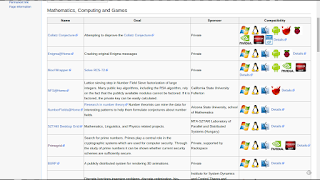

Your CPU hours are used not only to accurately model the structures of important proteins, but to design new ones as well. Thank you volunteers for your continued support to this project.
#Boinc projects update
With this update we will continue to make protein binders to SARS-CoV-2 and related targets using the latest Rosetta source. John, Dmitry Moskalchuk, David Tischler, Lloyd Watts, and Sahaj Sarup, we are excited to also include the Linux-ARM platform. To help our research, we are happy to announce a new application update, and thanks to the help from the Arm development community, including Rex St. With the recent COVID-19 outbreak, has been used to predict the structure of proteins important to the disease as well as to produce new, stable mini-proteins to be used as potential therapeutics and diagnostics, like the one displayed above which is bound to part of the SARS-CoV-2 spike protein. Please post any issues regarding this update in the discussion thread. You can reattach the project using this updated URL at your convenience. The project URL has thus been changed to. Switch to using SSL (Secure Socket Layer) Additionally, there are currently many similar designs that bind SARS-Cov-2 and related targets that were engineered using information is available from the publication, De novo design of picomolar SARS-CoV-2 mini protein inhibitors. Thank you all for your contributions to this research! Although was not directly used for the work described in the publication (link provided below), was used for designing relevant scaffolds. Here is a short video of David Baker describing some exciting results from de novo designs targeting SARS-Cov-2. We greatly appreciate your contributions which are vitally important to our ongoing research.Ĭoronavirus update from David Baker. We'd like to thank everyone who has contributed and continues to contribute to this project, and would like to remind everyone that there may be periods of down time while we are preparing for future large scale batches of jobs and analyzing results. The University of Washington is licensing the vaccine technology royalty-free for the duration of the pandemic.Ĭongrats and thank you again to all contributors! “If our vaccine is distributed through COVAX, it will allow it to reach people who need access.” “We know more than two billion people worldwide have not received a single dose of vaccine,” said David Veesler, associate professor of biochemistry at UW School of Medicine and co-developer of the vaccine. These attributes could enable vaccination at a global scale by reaching people in areas where medical, transportation, and storage resources are limited. The Seattle scientists behind the new vaccine sought to create a ‘second-generation’ COVID-19 vaccine that is safe, effective at low doses, simple to manufacture, and stable without deep freezing.

In addition, the South Korean government has agreed to purchase 10 million doses for domestic use. If approved by the World Health Organization, the vaccine will be made available through COVAX, an international effort to equitably distribute COVID-19 vaccines around the world. SK bioscience, the company leading the SKYCovione’s clinical development abroad, is now seeking approval for its use in the United Kingdom and beyond. The vaccine, now known as SKYCovione, was found to be more effective than the Oxford/AstraZeneca vaccine sold under the brand names Covishield and Vaxzevria. South Korea to purchase 10 million doses for domestic useĪ vaccine for COVID-19 developed at the University of Washington School of Medicine has been approved by the Korean Ministry of Food and Drug Safety for use in individuals 18 years of age and older.University of Washington to waive royalty fees for the duration of the pandemic.The protein-based vaccine, now called SKYCovione, does not require deep freezing.Clinical testing found the vaccine outperforms Oxford/AstraZeneca’s.
#Boinc projects full
The IPD is excited to announce it's first designed protein medicine with full approval abroad.Ĭongrats and thank you to all contributors! The computing you have provided has greatly aided in de novo protein design challenges such as vaccine development leading to breakthroughs like this.įor more information you can visit the IPD vaccine news post. COVID-19 vaccine with IPD nanoparticles wins full approval abroad


 0 kommentar(er)
0 kommentar(er)
